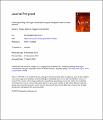Predicting limiting ‘free sugar’ consumption using an integrated model of health behavior
Phipps, D. J., Hagger, M. S., & Hamilton, K. (2020). Predicting limiting ‘free sugar’ consumption using an integrated model of health behavior. Appetite, 150, Article 104668. https://doi.org/10.1016/j.appet.2020.104668
Published in
AppetiteDate
2020Copyright
© 2020 Elsevier Ltd.
Excess intake of ‘free sugars’ is a key predictor of chronic disease, obesity, and dental ill health. Given the importance of determining modifiable predictors of free sugar-related dietary behaviors, we applied the integrated behavior change model to predict free sugar limiting behaviors. The model includes constructs representing ‘reasoned’ or deliberative processes that lead to action (e.g., social cognition constructs, intentions), and constructs representing ‘non-conscious’ or implicit processes (e.g., implicit attitudes, behavioral automaticity) as predictors of behavior. Undergraduate students (N = 205) completed measures of autonomous and controlled motivation, the theory of planned behavior (TPB) measures of explicit attitude, subjective norms, perceived behavioral control (PBC), and intentions, past behavior, implicit attitude, and behavioral automaticity at an initial point in time, and free sugar limiting behavior and behavioral automaticity two weeks later. A Bayesian structural equation model indicated that explicit attitude, subjective norms, and PBC predicted behavior via intention. Autonomous motivation predicted behavior indirectly through all TPB variables, while controlled motivation predicted behavior only via subjective norms. Implicit attitudes and behavioral automaticity predicted behavior directly and independently. Past behavior predicted behavior directly and indirectly through behavioral automaticity and intentions, but not implicit attitudes. Current findings suggest pervasive effects of constructs representing both reasoned and non-conscious processes and signpost potential targets for behavioral interventions aimed at minimizing free sugar consumption. ...
...
 ...
...
Publisher
ElsevierISSN Search the Publication Forum
0195-6663Keywords
Publication in research information system
https://converis.jyu.fi/converis/portal/detail/Publication/34985684
Metadata
Show full item recordCollections
- Liikuntatieteiden tiedekunta [3139]
Additional information about funding
No funding information.License
Related items
Showing items with similar title or keywords.
-
Adolescent sugar-sweetened beverage consumption : An extended Health Action Process Approach
Zhang, Chun-Qing; Wong, Marco Cheuk-Yiu; Zhang, Ru; Hamilton, Kyra; Hagger, Martin S. (Elsevier, 2019)Objective: Consumption of excess added sugar in the form of sugar-sweetened beverages (SSBs) contributes to a wide range of health concerns in adolescents. Identification of modifiable determinants of SSB consumption based ... -
A Dual-Process Model Applied to Two Health-Promoting Nutrition Behaviours
Brown, Daniel J.; Charlesworth, Jessica; Hagger, Martin S.; Hamilton, Kyra (MDPI AG, 2021)We tested a dual process model incorporating constructs that reflect both performing the target behaviour (behaviour directed habit) and habits that run counter to the target behaviour (opposing behaviour habit) in accounting ... -
Social cognition, personality and social-political correlates of health behaviors : Application of an integrated theoretical model
Griffith, Zoe M.; Polet, Juho; Lintunen, Taru; Hamilton, Kyra; Hagger, Martin S. (Elsevier, 2024)Objective Dispositional, intra-personal constructs such as personality traits and generalized beliefs are consistently related to health behaviors, but relatively few studies have tested the theory-based mechanisms by ... -
Reasoned and implicit processes in heavy episodic drinking : An integrated dual‐process model
Hamilton, Kyra; Gibbs, Isabelle; Keech, Jacob J.; Hagger, Martin S. (The British Psychological Society; John Wiley & Sons, 2020)Objectives: University students commonly engage in heavy episodic drinking (HED), which contributes to injury risk, deleterious educational outcomes, and economic costs. Identification of the determinants of this risky ... -
Predicting sugar consumption : Application of an integrated dual-process, dual-phase model
Hagger, Martin; Trost, Nadine; Keech, Jacob; Chan, Derwin K.C.; Hamilton, Kyra (Elsevier, 2017)Excess consumption of added dietary sugars is related to multiple metabolic problems and adverse health conditions. Identifying the modifiable social cognitive and motivational constructs that predict sugar consumption is ...

